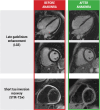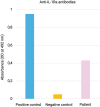Anakinra during pregnancy and lactation for corticosteroid-dependant colchicine-resistant recurrent pericarditis in a patient with neutralizing anti-interleukin-1 receptor antagonist antibodies: a case report
- PMID: 40585191
- PMCID: PMC12204188
- DOI: 10.1093/ehjcr/ytaf280
Anakinra during pregnancy and lactation for corticosteroid-dependant colchicine-resistant recurrent pericarditis in a patient with neutralizing anti-interleukin-1 receptor antagonist antibodies: a case report
Abstract
Background: Anakinra, an interleukin-1 receptor antagonist (IL-1 Ra), is a treatment option for recurrent pericarditis refractory to conventional therapy. However, some patients cannot discontinue anakinra treatment without relapse. This is of particular concern for women of childbearing age, as data on its safety during pregnancy and lactation is limited.
Case summary: We report the case of a 36-year-old White woman with recurrent pericarditis of an inflammatory phenotype. Pericardial biopsy revealed virus-negative fibro-productive pericarditis, and genetic testing showed no identifiable cause. Despite treatment with non-steroidal anti-inflammatory drugs, colchicine, and corticosteroids, the patient experienced multiple recurrences and developed corticosteroid-related side effects. Introduction of anakinra resulted in immediate clinical improvement and allowed corticosteroid withdrawal. However, several attempts to discontinue anakinra led to pericarditis recurrences. The patient tested positive for neutralizing anti-IL-1Ra antibodies. During the stable phase of the disease, as confirmed by cardiac magnetic resonance imaging, and while on anakinra and colchicine, she conceived spontaneously. She maintained anakinra treatment throughout the full-term pregnancy and breastfeeding, with no impact on foetal or child development.
Discussion: Our paper provides evidence supporting the safe use of anakinra in pregnancy and lactation in a patient with recurrent pericarditis. It also reports the first case of anti-IL-1Ra antibodies in a patient receiving anakinra for recurrent pericarditis, which may help explain the dependency on the medication. The potential role of these antibodies as biomarkers for anakinra dependency or tools for optimizing immunosuppressive treatment warrants further research. A patient-centred counselling and a multidisciplinary approach are essential for achieving optimal outcomes.
Keywords: Anakinra; Antibodies against IL-1 receptor antagonists; Case report; Lactation; Pregnancy; Recurrent pericarditis.
© The Author(s) 2025. Published by Oxford University Press on behalf of the European Society of Cardiology.
Conflict of interest statement
Conflict of interest. None declared.
Figures




References
-
- Adler Y, Charron P, Imazio M, Badano L, Baro´n-Esquivias G, Bogaert J, et al. 2015 ESC guidelines for the diagnosis and management of pericardial diseases: the task force for the diagnosis and management of pericardial diseases of the European Society of Cardiology (ESC) endorsed by: the European association for cardio-thoracic surgery (EACTS). Eur Heart J 2015;36:2921–2964. - PMC - PubMed
-
- Brucato A, Imazio M, Cremer PC, Adler Y, Maisch B, Lazaros G, et al. Recurrent pericarditis: still idiopathic? The pros and cons of a well-honored term. Intern Emerg Med 2018;13:839–844. - PubMed
Publication types
LinkOut - more resources
Full Text Sources
